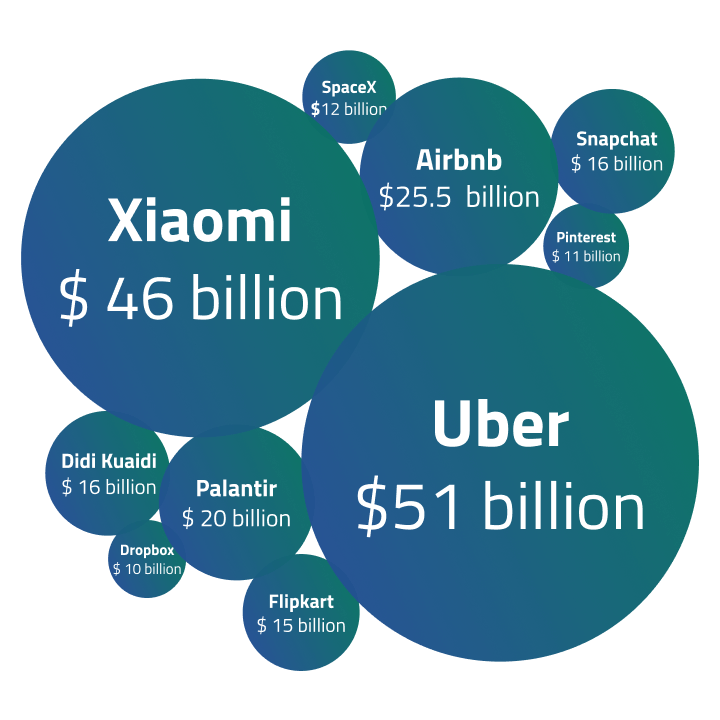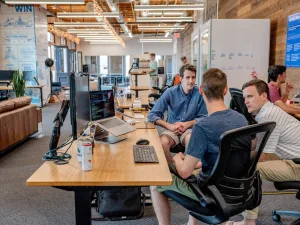Top 10 Startups were established in the United States, two in Asia, and India.
Top 10 Startups – Uber (USA) – $ 51 billion
It is the currently best-ranked startup in the world, with $ 51 billion. The company was founded in 2009 when the company’s current CEO, Travis Kalanick, and Jarrett Camp developed an app that connects riders with motorists who wanted to provide transportation services for a fee.
Top 10 Startups – The first people who had the opportunity to try the app were residents of the American city of San Francisco, who immediately fell in love with the service. The Uber app is used in more than 63 countries worldwide, and the service is available in more than 270 cities. Over time, Uber has come under fire for launching in many towns worldwide without taxi legislation. This is not the biggest problem Uber faces, as it was the most severe accident involving the company in India, where a company driver raped a customer.
The service has been banned in several cities in the United States, Europe, parts of China, India, and Thailand. However, in the last eight months of this year, Uber’s value increased by $ 10 billion.
Top 10 Startups – Xiaomi (Asia) – $ 46 billion
In just four years since its launch, it has become the largest smartphone supplier from China. In fact, in December 2014, the company won the title of the world’s most valuable startup and removed Uber from the throne in July 2015, according to the latest estimates.
Founder and CEO Lee Jun contributed greatly to the company’s popularity by borrowing the product offering’s aesthetics from late Apple founder Steve Jobs.
“Modern technology should not cost a fortune,” this is Li Jun’s mainline in business, a principle that we also find in the description of the company on the official website.
Top 10 Startups – Xiaomi introduces smart mobile devices with software and hardware specifications similar to those of major manufacturers. The company has also built a good reputation among users because it created a habit of updating the interface software that the devices were equipped with, taking into account the suggestions of buyers coming from social networks.
Top 10 Startups – Airbnb (USA) – $ 25.5 billion
In October 2007, Brian Cesky and Joe Gibia rented their apartment from San Francisco for one night. This experience brought them into contact with Nathan Blecharczyk, which helped them create an online platform that connects homeowners with enthusiastic travelers looking for cheap housing. According to airbnb.com, as of August 2008, more than 60 million users have managed to find a host in more than 34 thousand cities in more than 190 countries even though the platform.
Top 10 Startups – Hotel owners ignored this application in its early days. Still, now hotel groups are trying to stop the expansion of the emerging company under the pretext of public safety, and some are violating the regulations of some residential areas and long-term rental offers.
The company’s estimated value increased by 255% from January to July, when the last estimate was made.

Top 10 Startups – Palantir (USA) – $ 20 billion
It is an American company specialized in analyzing, interpreting, and representing links between information. And when we say information, you can think of phone numbers, email addresses, bank accounts, car numbers, and any other data packages of this kind.
The company’s technology foundations were laid in Pay Pal, an online payment platform that engineers have used to analyze web links to see how the network has performed. PayPal executives Joe Lonsdale and Peter Thiel founded the company in 2004 with Alexander Karp, the current and sole CEO of Palantir.
Top 10 Startups – Since 2009, the United States government has expired contracts with the software manufacturer worth $ 215 million. The company’s clients include the CIA, the FBI, NSA, Homeland Security, and the Department of Homeland Security. The company also helped place Bernie Madoff (known as the largest stockbroker in history) under indictment.
Several organizations defending fundamental rights and freedoms accused her of helping to establish companies in excessive surveillance.
Top 10 Startups – Snapchat (US) – $ 16 billion
In 2013, he caught the public’s attention, founder Evan Spiegel, 23 at the time, who had turned down a $ 3 billion bid for his company by Facebook.
Spiegel rejected the US giant’s offer, saying they had no experience managing the corporate model.
Top 10 Startups – After a night, this young man developed the Snapchat app with a friend and told him that he wished he had never sent certain messages. Thus was born an application that allows sending messages with a short life span, which the sender initially set.
According to the latest statistics published, Snapchat has around 100 million active daily users.
In 2014, the company recorded revenues of $ 3 million, which is a modest amount compared to this year’s estimated revenue.
Top 10 Startups – Didi Kuaidi (Asia) – $ 16 billion
Dache and Kuaidi Dache are two of the biggest taxi apps and have decided to merge in China to form a dominant domestic market player. Didi Kwaidi secured a $ 2 billion investment from Fusion, setting a new record for funding in the Chinese startup market. The higher capital will help the company compete with Uber.
Top 10 Startups – Despite the merger of the two companies, they continue to operate individually. Over time, Americans invested nearly $ 1 billion in the Shanghai Free Trade Zone subsidiary in 2015.
Flipkart (India) – $ 15 billion
Sachin and Benny Bansal together lay the foundations for India’s most large retail company using the savings they got while working in Karnataka’s capital, Bangalore, for a subsidiary of the US giant, Amazon.
Entrepreneurs followed a business path similar to that of Amazon, starting by selling books online due to the low price and the least impact of shipping damage. The next step was to sell electronics into a platform where small businesses could buy large resale products.
Top 10 Startups – Flipkart followed the Amazon model, and in 2013, it began selling tablets and other portable gadgets under its brand.
The biggest challenge for Flipkart is the market it operates in. Since becoming a major retailer in India, she has been losing money every day selling products less than the purchase price.
The company has been striving to maintain its edge in the Indian market against Amazon and SnapDeal.com, the local retailer.
At the end of 2015, the Indian retailer had 22 million registered users and hosted 3,000 companies selling millions of products.
SpaceX (USA) – $ 12 billion
Exploration Technologies Corporation or SpaceX is a company from the United States specializing in the design, implementation, and development of partially or fully reusable spacecraft.
Top 10 Startups – The startup was founded in 2002 by famous businessman Elon Musk, one of the founders of PayPal. He risked a large portion of his fortune to found this company. The company was initially a private company that launched a spacecraft into space and delivered supplies to the International Space Station. To launch some missiles, the company spent $ 70 million, which means about half the spending of the US Air Force.
Pinterest (USA) – $ 11 billion
From his childhood, Ben Silberman has loved collecting everything from beetles to stamps. In 2010, this hobby was behind the creative mind in designing Pinterest, an online platform that provides every user with a virtual schedule of images, links, and videos.
It became popular in the first months after its first release among multimedia artists, after which it began to be used by interior designers.
Top 10 Startups – The platform hosts over 30 billion unique items and doubles in number every nine months. The platform is also used by large magazines, such as Elle, or retailers, such as TechCorp, who have created their collections there.
Ben Silberman and Evan Sharp currently lead one of the world’s fastest-growing startups.
Dropbox Corporation (USA) – $ 10 billion
In Houston, he started developing the file-hosting platform Dropbox while on a bus ride.
IT market giants such as Microsoft, Google, and Apple have used the financial resources at their disposal to stop Dropbox’s rise by offering their file hosting services at lower prices.
Top 10 Startups – Since 2012, the number of users of the company’s service has tripled, and in 2015 Dropbox hosted the files of more than 300 million users.















